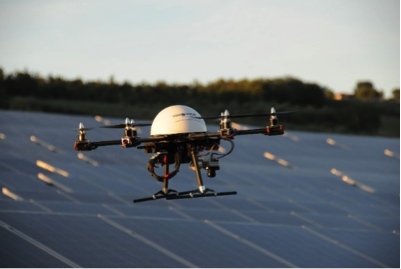As photovoltaic plants age, their efficiency often falls due to the underperformance of one component or another, requiring PV plant owners to conduct expensive and time-consuming thermal inspections to get to the bottom of the problem. EASY PV, a GSA-funded Horizon 2020 project, is using remotely piloted aircraft systems (RPAS) to provide a more effective and cost-efficient solution.
As Europe’s older PV plants start to reach over ten years of continuous operations, some of their individual modules and components are reaching the end of their design life span. The associated failures and breakdowns mean that plant owners are now paying a lot of attention to maintenance technologies and processes in order to enhance energy production at their plants.
operations, some of their individual modules and components are reaching the end of their design life span. The associated failures and breakdowns mean that plant owners are now paying a lot of attention to maintenance technologies and processes in order to enhance energy production at their plants.
High-quality EGNSS receiver
Thermographic analysis is the best and most effective way to locate defective cells and modules in PV arrays. However, thermal inspections, currently performed by operators with handheld cameras, are time consuming and can be expensive, due to the associated safety procedures required for those conducting the tests.
The current state of the art solutions exploit RPAS technology to gather thermal images. This reduces the time, costs and risks for personnel involved in maintenance operations. However, these solutions do not normally use geo-referencing techniques. This means that a huge amount of post processing work is required to get a PV plant status synthesis that is viable for the plant owners.
Responding to this need for a more efficient PV plant inspection solution, EASY PV (EGNSS High-Accuracy System Improving Photovoltaic Plant Maintenance) is building an automated system for acquiring, geo-referencing and processing images, both visual and thermal, using an RPAS equipped with a high-accuracy EGNSS receiver.
Marco Nisi, Head of Integrated GNSS Solutions at Sistematica S.p.A., the coordinator of the project, said that recent tests had shown extremely encouraging results. “The EASY-PV solution has had the experience of monitoring a dozen selected PV plants in Italy, mainly in Terni, Caserta and Cuneo. More than 98% of faulty panels were correctly recognised and a final report was generated in a very short period of time. This gives us the confidence to confirm our presence on the Italian market and paves the way to introduce the service all over Europe, thanks to our growing RPAS pilots’ and PV maintainers’ affiliation network,” he said.
Engaging with stakeholders
EASY-PV was presented at two energy events at the end of last year. At the first of these - the Key Energy trade fair in Rimini on 7-10 November - the GSA supported EASY-PV, attending as its main sponsor. At the event, the GSA also presented upcoming Galileo services that support energy-related applications to stakeholders in the energy value chain.
The second event was the O&M and Asset Management Conference in London in December, which was organised by the Solar Trade Association and SolarPower Europe (formerly the European Photovoltaic Industry Association – EPIA). The EASY-PV solution was presented as a case study at this event, which facilitated networking with peers, clients and suppliers. Galileo was introduced as a key element of the EASY-PV solution, with the GSA acting as a partner - promoting O&M best practice guidelines across Europe, increasing awareness and encouraging industry uptake.
Media note: This feature can be republished without charge provided the European GNSS Agency (GSA) is acknowledged as the source at the top or the bottom of the story. You must request permission before you use any of the photographs on the site. If you republish, we would be grateful if you could link back to the GSA website (http://www.gsa.europa.eu).